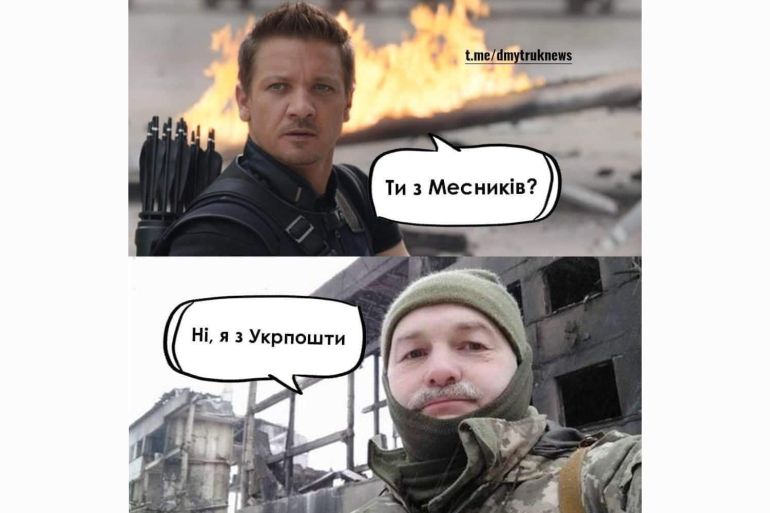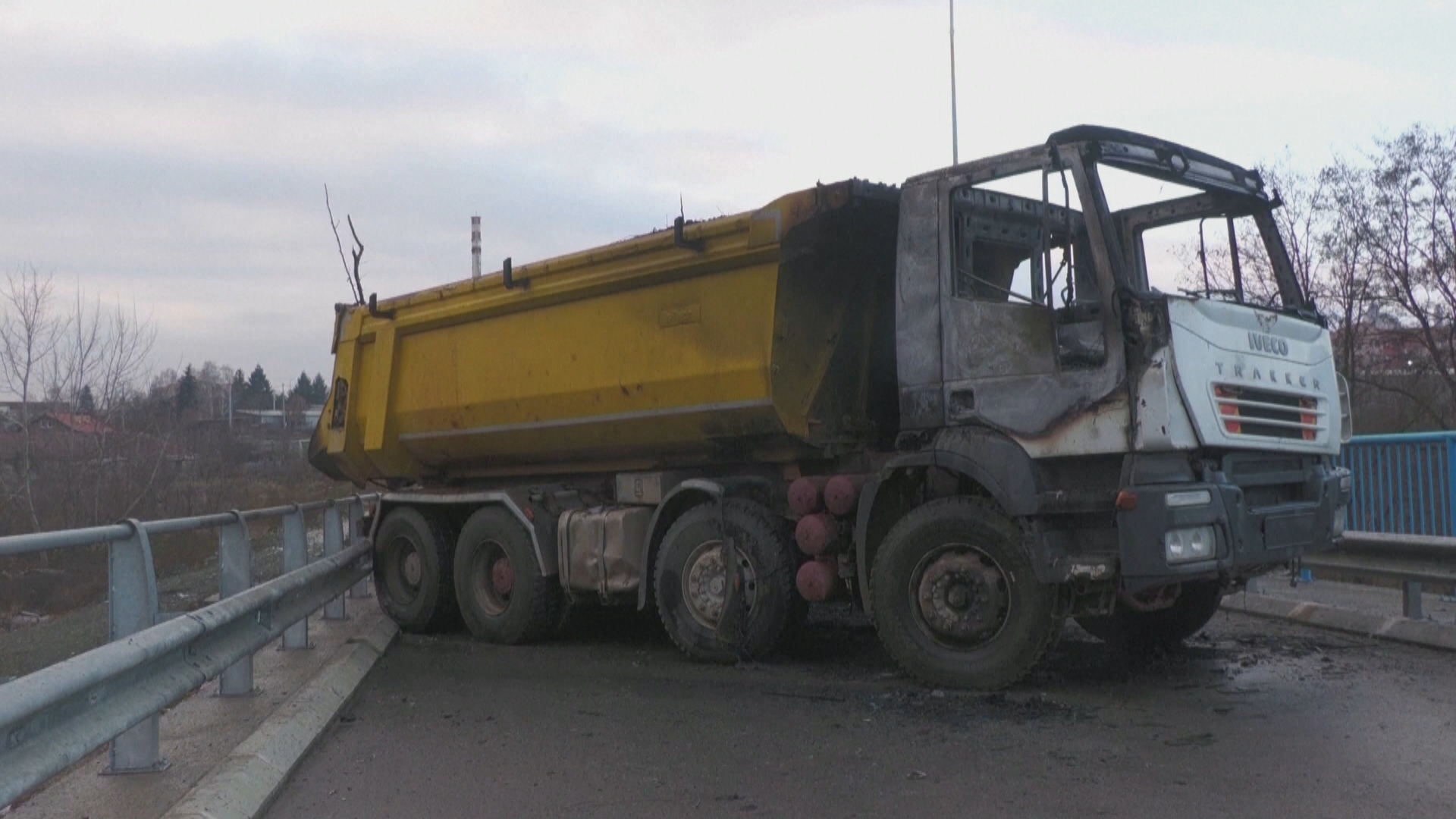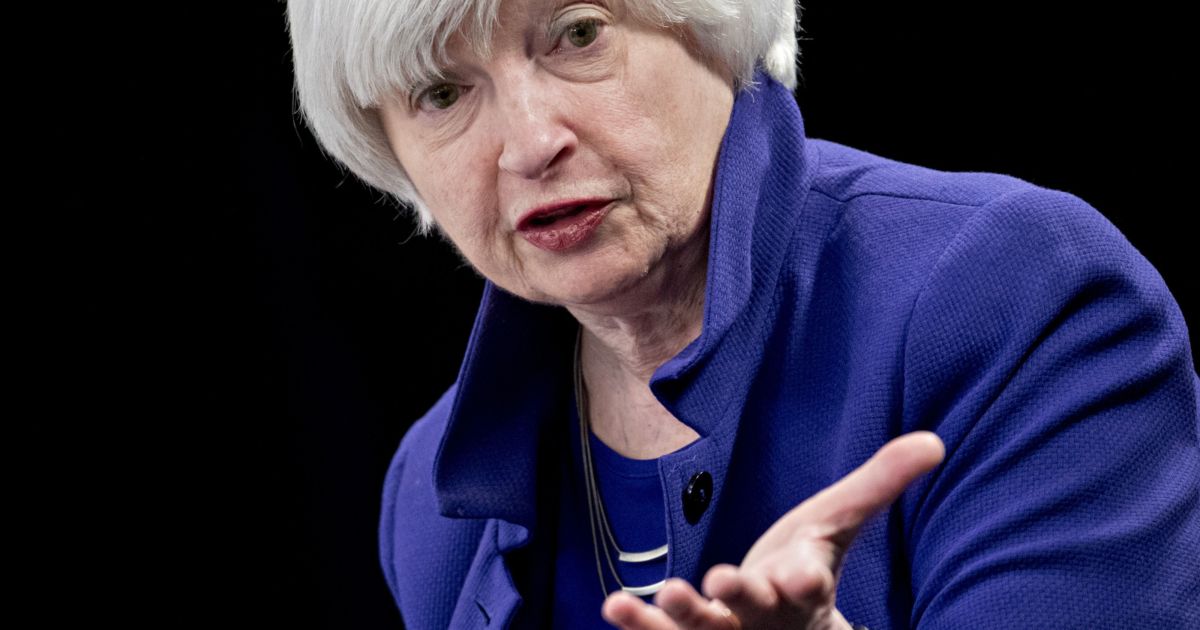As bombs fall on Ukraine, memes ridicule Russian aggression | Russia-Ukraine war News
Kyiv, Ukraine – “Are you one of the Avengers?” reads a speech balloon next to Clint “Hawkeye” Barton, a character from the popular movie franchise played by Jeremy Renner.
“No, I am from the Ukraine Post,” is the answer next to the photo of Serhiy Chizhikov, a postal worker who joined the Ukrainian military after Russia invaded Ukraine on February 24 – and shot down a Russian Su-35 plane near the besieged city of Kharkiv on Saturday.
This is a popular meme circulating in Ukraine since the war erupted.

Dozens more jokes, memes, tweets and YouTube sketches have emerged ridiculing Russians and their President Vladimir Putin, lauding Ukrainian servicemen and lambasting NATO and the European Union for not providing enough help.
A snapshot of film star Mel Gibson sitting next to the actor playing Jesus Christ in his 2005 “The Passion of the Christ” drama – barefoot, clad in a blood-covered tunic, wearing a crown of thorns – spawned a meme about how “NATO explains why it refuses to declare Ukraine a no-fly zone.”
Sometimes, the wartime humour is pretty cynical.
An iconic image from Stanley Kubrick’s 1980 horror movie The Shining, depicting a woman screaming as Jack Nicholson’s character breaks into her room with an axe, is now a macabre meme depicting the mother of a Russian soldier seeing an incoming call from a phone number with Ukraine’s +380 country code.

The irony, satire and outright cynicism help Ukrainians cope with stress, loss, uncertainty and violence around them.
“This is an outlet for releasing excessive aggression so that we are not engulfed in fear,” Kyiv resident Olexander Lisenko told Al Jazeera.
It is also “a psychological defence mechanism so that one doesn’t get too affected by the sight of flesh, blood and so on – because each warrior will have a rollback, although in various degrees”, he said.
“When I was sitting in a bomb shelter with children, the only thing that made me smile were memes my friends sent me on Viber,” Olha Krutitsyna, a 47-year-old mother-of-three who has spent almost every night of the war in a bomb shelter next to her apartment building in central Kyiv, told Al Jazeera.
Here is one of her favourites: “How do you cope with problems during this war? Imagine your problems as a Russian warship. And tell it to go f*** itself.”
The joke is based on what 13 Ukrainian servicemen stationed on the Black Sea island of Zmeiny told a Russian warship in response to an offer to surrender on February 25.
The Black Sea port of Odesa, Ukraine’s third-largest city and the birthplace of some of the most outstanding comedians known all over the former Soviet Union, most of whom are Jewish, is making its satirical contribution.
“Simon, I don’t understand,” goes one, styled as a story told by one Jewish man to another. “Three Russian helicopters flew in. And then 30 paratroopers landed. And then they all died. I don’t understand. What was the meaning of all that?”
In the Soviet era, a good joke was as perilous as an openly anti-Communist statement – people were sentenced to jail or even death for ridiculing Soviet leader Josef Stalin.
But humour was crucial to “preserving at least a pocket of independence and individuality in the face of a totalitarian machine that strove to control all walks of Soviet life, including the language,” Pavel Luzin, a Russia-based analyst with the Jamestown Foundation think-tank, told Al Jazeera.
Entire genres of underground jokes that made fun of Communist leaders and all walks of Soviet life emerged – and were later compiled into voluminous anthologies.
Ukrainians were often the brunt of Russian jokes – they were ridiculed as greedy, rustic and humourless.
A popular Russian joke goes: “A Ukrainian boy writes a letter to Santa, ‘Dear Santa, I want Russians to shoot you down so that you fall next to my house. The West will sanction them for this, and I will get all the presents!”
And Ukrainians hit back by making fun of Russians.
“A Russian hikes in a Ukrainian forest. A Ukrainian armed with a pistol approaches him saying: ‘What are you doing here?’ The Russian responds: ‘Picking mushrooms.’ One second before shooting the Russian, the Ukrainian yells: ‘But you haven’t planted them!’”
Even Ukraine’s incumbent President Volodymyr Zelenskyy was once head of the Studio 95 comic troupe that ridiculed Putin and top Russian politicians for years.
He once compared Putin to a baby who “can control his gas”, and said Prime Minister Dmitri Medvedev is against blocking Facebook in Russia because it “is the only place where Medvedev is offered friendship”.
In a mock news report from Moscow’s Red Square shot in 2014, Zelenskyy said: “Everything is democratic here.
“One can yell, ‘Glory to Ukraine,’ and nothing will be done to them. Nothing modern healthcare can’t handle.”
Even Putin appreciated Zelenskyy as a comedian once.
“Zelenskyy is a talented person, I remember his performances in Moscow. It was all talented and funny. But now it is not. This is not comedy, this is tragedy,” he said in 2019.
But these days, Zelenskyy is feeling far from humorous.
The 44-year-old, who was elected in 2019 and whose approval ratings jumped to 75 percent during the war, is busy challenging Putin to a face-to-face meeting and rallying support for his country’s sovereignty.
“I am a normal man, sit down with me to talk, what are you afraid of?” Zelenskyy said recently.




